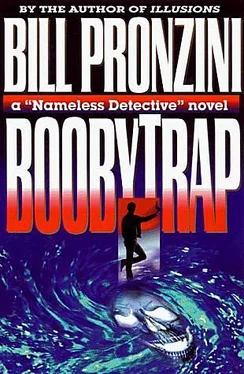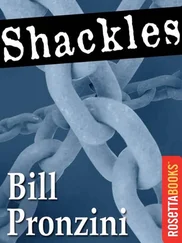I lowered the binoculars for another quick check of my watch — just nine o’clock — and then leaned a steadying shoulder against a eucalyptus bole and watched the houses through the glasses. One minute, counting the seconds off inside my head. Two minutes. Two and a half—
The porch light came on.
The door opened and Latimer walked out.
No mistake; his head was up and the outside light slanted across his face. Latimer. Alone, and carrying a small suitcase in one hand.
He didn’t pause to lock the door. He came straight down the steps, veered to his right to the detached garage and hauled up the door. The rented Toyota was inside; I could just make out the bulky shape of its rear end. Latimer vanished into the shadows on the driver’s side.
I waited long enough to see exhaust vapor billow out when he started the engine. Then I was off and running back through the trees.
For a little time it was like rushing through a nightmare wood, blind and stumbling. If the eucalypti hadn’t been widely spaced I might have done myself some damage; as it was, I managed by luck and intuitive radar to get to where I could make out the shapes of the fallen tree and the car beyond it with only a couple of trip-and-staggers and no falls. Haste was imperative, the only thing on my mind.
My feet got tangled in some strips of peeled bark as I climbed over the downed tree; I kicked loose, doglike, and lurched to the car. I slid under the wheel, tossing the binoculars onto the backseat. The keys dangled from the ignition where I’d left them. I got the engine going and the car moving within a few seconds, making a conscious effort not to jazz the throttle and surge ahead too fast. The machine rocked and bounced in the ruts and then I was out onto the road, angled straight across, blocking it about twenty yards from the curve. There was still room to get around on both sides, but not without easing off slow onto rough ground.
I jammed on the parking brake, shut off the motor and pulled the key out and flipped the trunk release. When I was free of the car, I could hear him coming, a low rumble just distinguishable above the cry of the wind and the beat of the surf. Close but not too close yet; driving fast enough from the sound of it. I ran back and leaned into the trunk and pawed in the carton in the back corner and dragged out one of the pairs of emergency handcuffs I keep in there. Stuffed them into my pocket, banged the lid down.
The Toyota’s headlights were visible on the blacktop now, laying down a whitish sheen that extended to the fence posts and lengths of wire separating the road’s edge from the pumpkin field.
I ran away from the car, back toward the trees so the Toyota’s lights wouldn’t pick me out when Latimer made the turn. Something on the .38 snagged in my pocket as I tried to free the weapon; I cursed and yanked hard, heard the faint ripping of cloth as it tore loose. Then it was out and tight in my fingers and I was in a half crouch in the grass and shadows a few yards off the road, a dozen yards from my car.
The engine whine grew louder; the headlamp beams began their sweep as he drove into the curve. The instant I saw the Toyota’s nose I knew he wouldn’t be able to stop in time straight on. I was up and already starting forward when the lights threw the shape of my car into bright relief.
Latimer stood on the brakes, cramping the wheel to the left to protect his side from impact — the instinctive reaction I’d counted on. Tires and stressed brake linings screeched; the station wagon slid sideways into my car in a three-quarters broadside. Not hard enough to raise much noise or do much damage to either one, but with sufficient force to stall the Toyota’s engine, knock something off one or the other’s body. There was a metallic clatter on the pavement as I ran up on Latimer’s side with the gun extended. The driver’s door wasn’t locked. I yanked it open with my left hand, my mouth coming open at the same time to yell at him to freeze where he sat.
He should’ve been confused, if not stunned or hurt; I should’ve been able to get him under the gun and keep him there. But it didn’t work that way. He was already moving when I opened the door, lunging straight up at me, his face twisted and shining masklike in the dome light. I did not have enough time to set myself or to pull the .38 back out of the way; he plowed into me and one hand struck my arm above the wrist, dislodged the piece and sent it flying. He wedged his shoulder into my sternum, wrapped his arms around my body, and drove me backward and then down under his weight.
If he’d been bigger, if I had landed on the blacktop, it might have been over then and there — for me. The back of my head banged into the ground, but it was mostly thick grass there on the verge, and that cushioned the impact. Still, my vision went out of whack; light and dark images danced and collided and swam apart. He was still on top of me, spitting and snarling in my face, one of his hands groping for my crotch. I bucked him off. But he was back before I could roll over and lever myself up into some kind of fighting position. Pinning me down with torso and legs, swinging with both hands.
Even flat on my back I was able to fend off most of the blows. You can’t get much leverage or power behind a punch at close quarters. But I still couldn’t see very well; he was just a dark blur in front of my face. I blocked two more swings, but the one after that got through and slammed into my Adam’s apple. Pain erupted; I thought in that first instant that he’d crushed something in there. I couldn’t breathe, couldn’t swallow, couldn’t move my head.
His big mistake was in not following up, because in those first few seconds after the blow landed I was pretty much helpless. Only he didn’t know that, didn’t realize where or how hard he’d hit me, and in the darkness and sweaty heat of battle he couldn’t see me pawing at my throat. All he knew was that I was flopping around, kicking my legs, and that I was bigger and stronger than him, even if he did have fifteen years on me; he wanted no more of this kind of give-and-take. The punches stopped coming. He was off me then, and through the blood-pound in my ears I could hear him scrambling away, then beating frantically at something nearby.
The fence. Trying to get over the fence.
I rolled over, shoved onto my knees. My vision was no longer cockeyed, but ghosts kept fluttering at the edges and I was trying to look through them and through a haze of sweat; it took a few seconds to get a bead on Latimer. He was over the fence by then, stumbling off among the pumpkin vines. Ex-military man, ex-con, vicious murderer — fleeing across a pumpkin field like a frightened rabbit.
It took two tries to get on my feet. I could breathe all right through my nose, but my throat was on fire; pain pulsed up into my skull with the first step I took, kept on pulsing in harsher surges as I staggered to the fence. I could not climb the thing — my body wouldn’t respond that way. Latimer had bent the fence inward making his climb, so I went through it at the same point, bending wire and uprooting posts, knocking it flat the way a tractor or a tank would. Ahead, Latimer was looking back and he saw me coming; it must have been a hell of a fearful sight because he tripped in his haste and fell and then scuttled like a crab before he was able to regain his feet.
The field was mostly plowed earth and vines and developing fruit. The going wasn’t too bad as long as you stayed in between the rows. I had a head of steam up, and when Latimer stopped and then bent and groped along the ground for something to use as a weapon, I knew I had him. Panic had taken him over, and panic loses a two-man confrontation — most other confrontations — nearly every time.
Читать дальше












